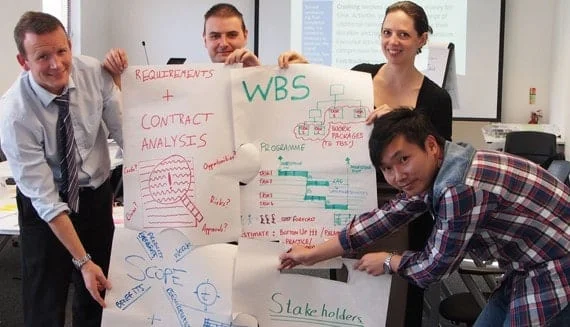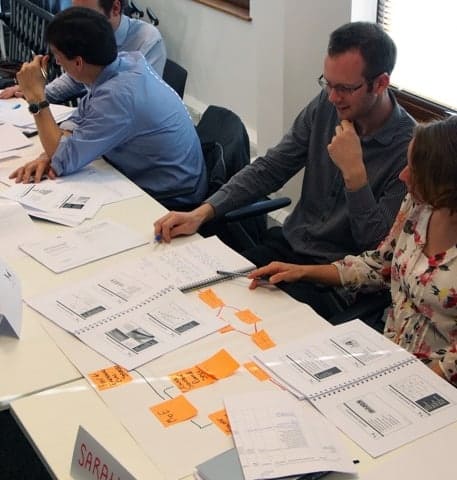How Tony Gee’s Innovative Project Management Training is Transforming the Future of Engineering Design Consultancy
Tony Gee is an engineering design consultancy that prides itself on excellent technical design in the rail, highways, marine and energy sectors. The majority of Tony Gee’s almost 600 staff are based in the UK with other offices in Hong Kong, Canada, the Emirates, Malaysia and Singapore.
One thing that sets Tony Gee apart from other engineering design consultancies is that they are a partnership so the company is owned by the employees. This factor changes the way they approach all aspects of the business, because they’re not under pressure from any external bodies to only focus on the bottom line. It means they can decide, for instance, how much they want to invest in training or how quickly they want to grow. That’s all decided internally and they rightly pride themselves on this collaborative culture that keeps all employees involved in decision-making.
In 2023 the company retained their Investors in People gold standard and have made progress towards a number of the platinum level indicators.
Typical Tony Gee projects
Here are some current examples of Tony Gee’s projects:
Transpennine Rail Upgrade (TRU)
Tony Gee are part of the Alliance delivering the Transpennine Route Upgrade (TRU) – a major, multi-billion-pound programme of railway improvements which will bring better journeys to passengers travelling across the Pennines between Manchester, Huddersfield, Leeds and York.
Regional Delivery Partnership (RDP)
Tony Gee is part of the team delivering major highways projects for National Highways, including schemes on the A417 (Missing Link) the A66 and the M6 (Lune Gorge) all part of the £8.7bn framework for delivering improvements to our roads.
Viking Wind Farm
Tony Gee has been involved as designers on Viking since 2015. It will be the UK’s largest onshore wind farm in terms of annual electricity output once complete in 2024, playing a crucial role in contributing towards the UK and Scotland’s net zero targets. It will be able to meet the needs of 475,000 homes and save half a million tonnes of carbon dioxide every year.
Recognising Project Management as an essential skillset for Engineers
Project Engineers at Tony Gee are predominantly civil, structural or geotechnical engineers who, a decade ago when the company was small, would have typically managed 3 or 4 small projects. At that time, processes and communication were straightforward, but as the company grew there were elements of control that needed to be applied more rigorously. They needed to modify or upgrade their way of working to make sure that they continued to meet deadlines, manage costs, achieve safety and quality levels, and communicate effectively between internal teams on larger more complex projects. Being involved in larger scale projects also resulted in a need to reconsider their ways of working across geographical locations – projects would be delivered by colleagues in several locations – they could, for instance, have somebody working in the Malaysia office on CAD (computer aided design) elements of a UK engineering project so expertise needed to be shared between remote teams.
“The course was very insightful, and the five sessions made it a really effective way to transfer the information.”
As a consequence, over 10 years ago, the Board of Tony Gee recognised that project management needed to be part of the skill set of their engineers and began an integrated programme of training, procedural and systems upgrade and organisational change aimed at increasing their PM capability. As Part of this programme they began working with Parallel Project Training to introduce project management training as part of the wider development programme for engineers.
“This is the best course I’ve been on for a long time. I was very impressed by the course and the presenter.”
A Bespoke Training Programme
The initial training programmes understood that Tony Gee’s projects covered a wide range of size and complexity and so implemented two streams of training – one for smaller, less complex projects, and one for larger more complex projects.
Both programmes focused on how to apply the core principles of project management to a Tony Gee project. They were based on the introductory certificate from the Association for Project Management (APM), which was a 2-day training course, and a more advanced, bespoke 5-day training course developed in conjunction with Parallel Project Training based on the APM PMQ (previously the APMP). Although neither entail an exam, these tailored courses cover the behavioural aspects of managing a client through role play and project simulation in the same way as the standard APM PMQ courses delivered by Parallel. The courses are:
Project Management Core Projects – for project engineers managing smaller, less complex projects. These are 1-day courses mainly delivered virtually via a series of videos, followed by an interview with a project director to make sure the concepts have been understood and can be applied in the workplace.
“Great training course – very clear, great recommendations, and plenty of exercises to keep me entertained and engaged.”
Project Management Complex Projects – this 4-and-a-half-day course is delivered live (partly virtually and partly in a face-to-face classroom setting), and is for more experienced project engineers, who intend to progress to become a project manager. This new level of Project Manager is much more of a specialist who manages larger and more complex projects, particularly where there’s a high level of risk involved. On design engineering projects, risk can be in terms of the actual danger in the safety aspects of a project, but also the risk of financial impact for the company, for example. And so that level of expertise needed to be developed within the company.
“The training was very useful, and it was good that it was tailored to us, as this made it more applicable and transferable to our day-to-day work.”
The impact so far
Rachel Gentil, Learning and Development Manager at Tony Gee, has overseen the evolution of the training programme and said, “We’ve spent a lot of time looking at how project management works here at Tony Gee for our design engineers, rather than the, perhaps, idealistic approach that the APM presents. And so, the core project course and the complex project course now deliver a tailored approach aligned with our internal processes but still contain some core elements of the APM Body of Knowledge.“
“It’s been a pleasure seeing project management in Tony Gee develop since I started working with them over a decade ago.” said Paul Naybour, Director of Parallel Project Training. “They are an engineering company first and foremost, but recognise the importance of project management as part of the engineers’ skillset, and have invested in the continuing development of those skills with this training programme.”
“It’s been great to work with Paul and Parallel to develop these bespoke courses to get the maximum benefit for the company and the individuals” said Howard Simpson, Group Director at Tony Gee. “They have been the ‘acorn’ from which we now have a far more robust ability to manage challenging projects. They have also encouraged a growing number of people to gain the PMQ qualification and we are now employing Project Professionals as part of our teams.”
The future
Apprentices and new graduates make up as much as 25% of the Tony Gee workforce and most are working towards a professional accreditation in civil engineering with ICE (Institution of Civil Engineers) or equivalent structural or geotechnical engineering accreditations. However, the company funds membership of a second professional body and their employees are increasingly joining the APM as well.
As the company continues to grow they are now adapting their PM Capability Programme to reflect an increasingly higher role in the supply chain and have created a number of PM Support Offices within their teams to support their delivery of multi-million commissions under NEC contract conditions.
The company has its own e-learning course for Project Engineers, some 40-odd modules around the operation of its internal processes and commercial approach, and these underpin the classroom training provided by Parallel Project Training (PPT). These, and associated interpersonal and leadership skills, will be further developed to ensure employee competence, with an emphasis on including their overseas offices. A number of employees have completed the APM’s PMQ in the last few years, also through Parallel, so the company has both employees with a good spread of wider project management knowledge and others with the targeted working knowledge to make their own projects a success.

